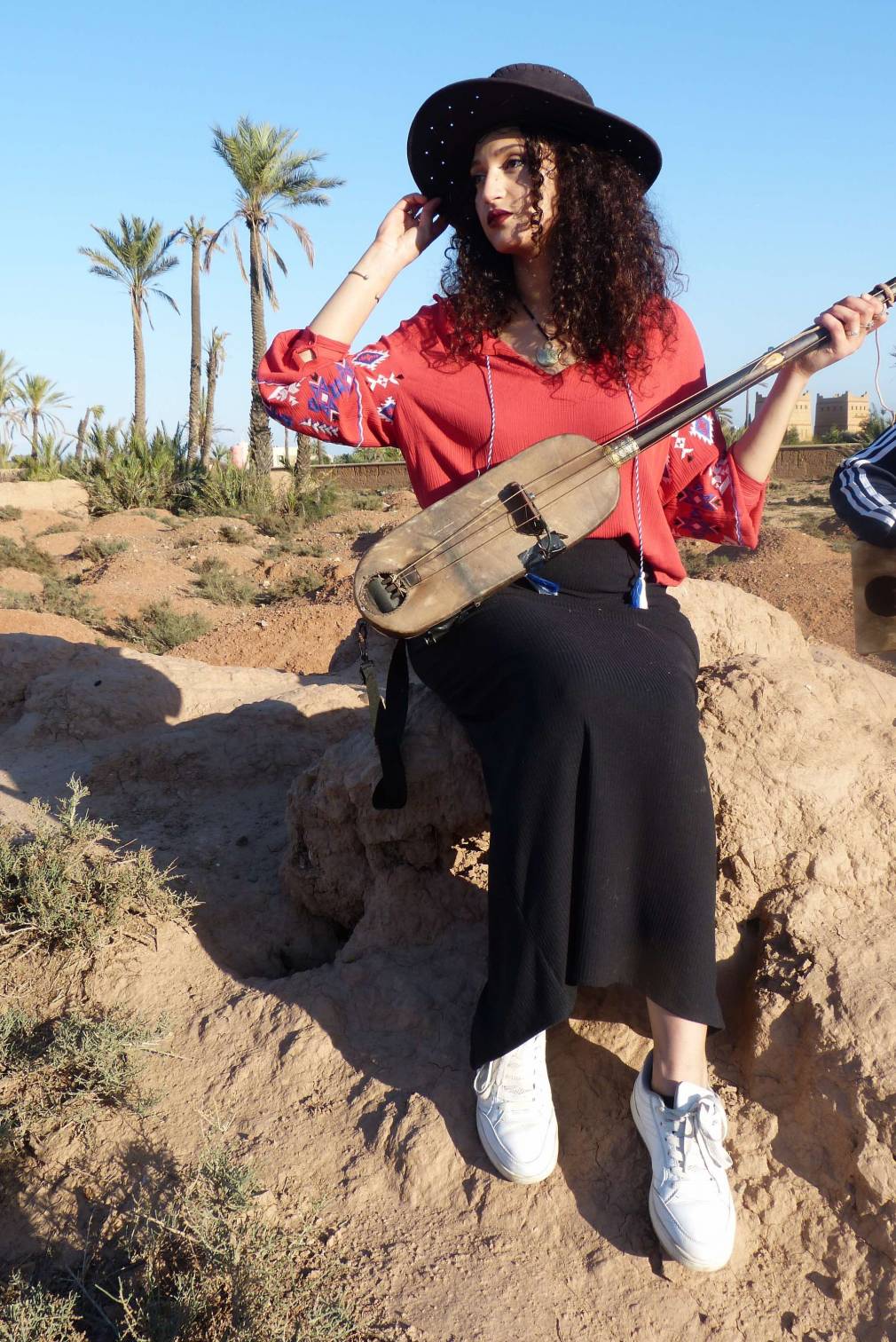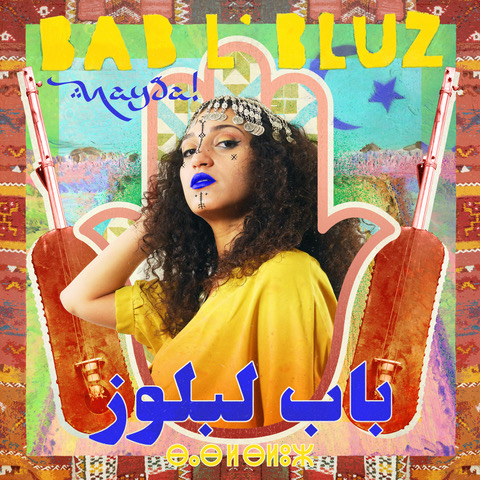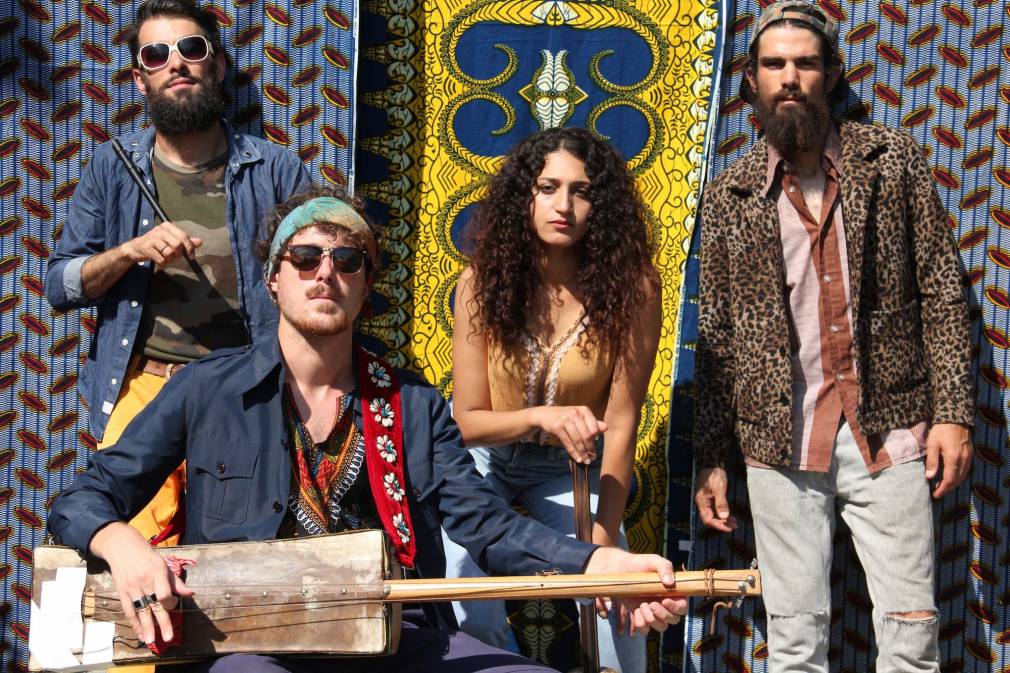In Morocco, Nayda – meaning ‘awakening’ or ‘uprising’ in Darija, the Moroccan Arabic dialect – refers to a festive movement of urban youth, a diverse and protest-fuelled artistic renewal, ‘a community of minds’ according to Mohamed Merhari, one of the founders of the L’Boulevard festival in Casablanca. This festival has been the showcase of the movement which, since 1999, has shown off emblematic figures such as Hoba Hoba Spirit, Casa Crew, and the rapper Bigg. Twenty years later, Bab L’Bluz still has faith in this movement, naming their first album after the creative energy found there. That’s not the only reason though.
‘Nayda is also a call for reflection, an intellectual and spiritual awakening,’ explains Yousra Mansour, the quartet’s velvet voiced singer. ‘For most of the lyrics, I chose to use a poetic Darija, albeit a fairly simple one, so as to touch the whole Arab world. This record is an invitation to question all forms of dogmatism.’ Bab L’Bluz brings to life a magnetic Gnawa sound, fed by psychedelic rock and bohemian hippie vibes, Indian tabla and tanpura, along with some occasionally spacey instrumentation.
Yousra Mansour also refers to Nass El Ghiwane and conjures up a bit of his anti-conformist soul. In the 1970s, he rehabilitated Morocco’s popular musical traditions and the poetry of its language, Darija, with powerful rhythms and strong lyrics that got many conservatives riled up. ‘We’re less revolutionary than Nass El Ghiwane,’ she laughs. As on “Ila Mata”, the first single whose lyrics are inspired by a poem from the Tunisian activist Anis Shoshan, it is true that Mansour sings about peace and love – including transcendental love – but she doesn’t hold back from expressing her indigance, in English, on the track “Africa Manayo”.
‘Seeing Africa washed with poverty is something that we don’t accept! Why are people starving while their land is fertile?’ she asks. ‘In the name of capitalism or of religion, people are plundering wealth, sucking up resources, and manipulating people. It’s not right.’
Whether in Bambara, Hausa, Fulani, Sudanese, she calls the people to rise up. Don’t worry though – she’s concocted an antidote to the people’s anger with “El Gamra”, an ode to the moon and its healing powers, similar to the healing powers of Gnawa music.
A convergence of the blues
Every year as a teenager, Yousra Mansour and her parents travelled along the shores of the Atlantic to attend the Gnawa and World Music Festival in Essaouira. Since 1998 it’s been a Mecca for trance, improvisation, and Gnawa traditions all fused together with rumba, gospel, santeria, flamenco, Hindustani, blues, reggae, jazz, rock, and yoruba sounds.
‘I saw all the maâlems (‘masters’ in the Gnawa tradition), especially Hamid El Kasri. I love his depth! I also loved the younger artists like Hindi Zahra and Mehdi Nassouli. It didn’t matter what the programme was, we were there! This festival created a very special link between myself and Gnawa music, and with African blues in general,’ she says.
It was no coincidence then that, at the end of 2016, she met Brice Battin within the Marrakech Jazz Beat collective, who combine jazz and Gnawa music. Together they would become the architects of Bab L’Bluz. One, a Savoyard based in Lyon, a lover of polyrhythms and improvisation, and the other a daughter of El Jadida and a lover of experimentation, who was finding her voice and seeking change.
Marrakech is also where the idea of a joint project was born, when the duo set out to learn guembri (him) and awicha (her) – two lutes with three strings, totems of traditional Gnawa music and rites. Both attracted to trance sounds, Yousra Mansour and Brice Bottin then explored these instruments’ hypnotic bass potential. With this they composed the ten tracks of Nayda, at the crossroads of pan-African blues – Mauritanian, Egyptian, Berban, and Malian – as well as American Delta blues whose transatlantic echo can occasionally be heard.
‘Marrakech is a city that means a lot to both of us. During the recording of the demos, we’d go out into the medina and see our friends playing in the Jemaa El Fna square. We needed that atmosphere, that inspiration. It’s not the same in [Lyon’s industrial centre] the Part-Dieu!’ says Yousra Mansour, who now splits her time between Lyon and her hometown.
Because it has a vision and a sense of celebration, Bab L’Bluz has fun mixing ancestral qraqebs (metal castanets) with Jérôme Bartholomé’s flute, Hafid Zouaoui’s rock, afrobeat drums, funk accents, and the lightness of Chaâbi music. They also invite musicians who don’t care about division: Mehdi Nassouli on “El Watane” for a celebration of the richness of the African continent, and Aziz Ozouss whose ribâb – a Berban hurdy-gurdy – surfs on ambient tanpura loops on the album’s only cover, “Waydelel”, a hassani poem by the diva of the Mauritanian desert, Dimi Mint Abba.

Warriors
‘I’ll never tire of her voice or her music. Dimi Mint Abba seems to be so strong, you just have to see how much she’s done…it’s extraordinary’, explains Yousra Mansour. When she was younger, the singer also practiced by singing songs from Janis Joplin, Oumou Sangaré, Tina Turner, Aretha Franklin, and Fairouz, already gravitating towards strong women who’d overcome something. ‘My idols, my examples, are honest women who have suffered,’ she says. This passion even drove her to pay tribute to the courage and patience of mothers on the bewitching “Yemma”.
‘My mother? A warrior! After the death of my father, she raised her five daughters alone in the midst of patriarchal and conservative Moroccan society, pursuing a career as a teacher. It was very difficult, but my mother always encouraged us to follow our dreams without worrying about the judgment of others.’
Ever the optimist, Yousra Mansour adds that ‘in Morocco today, women are asserting themselves in many fields and fortunately, mindsets are shifting in the right direction.’ In 2004, initiated by a powerful feminist movement, and an edict from the king, Morocco implemented a spectacular reform of the Moudawana, the family code. Thanks to this change, Moroccan women finally gained equality in the law, allowing them to ask for divorce, and marriage as a minor has become very rare. In reality, however, illiteracy – at nearly 50% amongst women – traditional ways, and a big difference between urban and rural life, still prevent the emancipation of many Moroccan women.
‘I’ve already been reproached for choosing music because I’m a woman,’ says Mansour, who deplores the association of a career in music with a bad life. Whether the phallocrates like it or not, Gnawa is now played by women, following in the footsteps of Hasna El Becharia – a desert rocker since the 1970s – the voices and guembris of Asmaa Hamzaoui, Hind Naira, and the group Bnat Guinea led by Sana Guinea, the daughter of the great maâlem Mokhtar Guinea. All of these voices are now being heard and a new generation of artists are arising who, like Yousra Mansour, can be proud to have the blues!
Bab L’Bluz, Nayda (Real World), out now.

